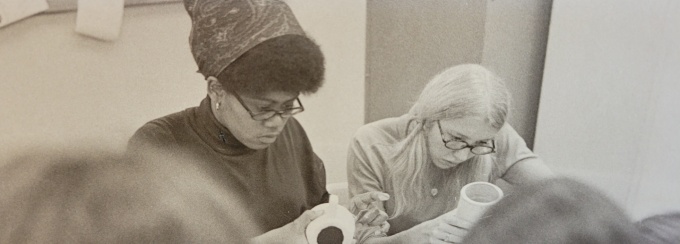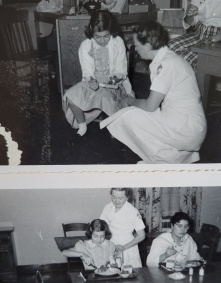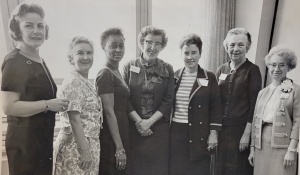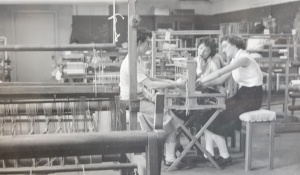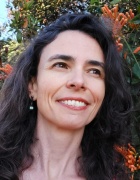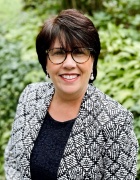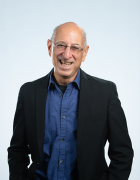UB Occupational Therapy Program 70th Anniversary
The University at Buffalo celebrates the Occupational Therapy Program's 70th anniversary with programming throughout the 2024-2025 school year.
UB's Occupational Therapy Program was established in 1954 in response to a growing unmet need for trained OTs in the Buffalo area. Since that time, we remain committed to training skilled professionals to serve the communities in which they live and practice.
What are you looking for?
UB Occupational Therapy Program 70th anniversary scrapbook
The beginning of OT at UB
Mrs. Gertrude Dray, founder of the Occupational Therapy program at UB, works with a young patient at the Chronic Disease Research Institute. photo ca 1953
In 1953, Gertrude Dray, an occupational therapist at the Chronic Disease Research Institute in Buffalo (CDRI), met with Stockton Kimball, Dean of the Medical School at the University at Buffalo, to discuss plans for an occupational therapy program.
In a letter to Dean Kimball, Dray wrote, "The need for trained personnel in the Buffalo area has not been met and is not being met, with the margin becoming wider as the demand for occupational therapists in the local institutions increases."
With the support of Dean Kimball, Mrs. Dray created an OT curriculum to meet the educational standards of AOTA.
In 1954, UB's Occupational Therapy program began running in borrowed office space at CDRI, on Main Street just north of Sisters Hospital. The program moved into Capen Hall in 1958. By 1961, 50 students were enrolled in the program, run by one full-time faculty member and 5 part-time instructors.
In 1962, Mrs. Dray was appointed as the OT program's second full-time faculty member.
Nancie Greenman, far right, served as UB's first OT program director from 1954 to 1971.
Nancie Greenman's Appointment
In July 1954, Nancie B. Greenman was appointed Program Director of the Occupational Therapy program. She was expected to get a class together for that September, and ended up with two students for the B.S. program (one freshman and a junior transfer from Michigan), and five enrollees in the one-year certificate program, designed for students with a baccalaureate degree. Greenman served as UB OT Chair from 1954 - 1971, and established an OT student travel fund which continues to support UB OT students, including funding busses to Albany's capitol building for the annual NYSOTA Advocacy Day.
In this photo, taken at an AOTA conference circa 1965, Nancie Greenman is on the far right wearing a flower corsage and "Host" badge. She stands with six pioneers of the OT profession, from left to right: Florence M. Stattel, OTR, Chief Occupational Therapist at the Kessler Institute; Francis Helmig, Executive Director of AOTA; Wimberly Edwards, MS, OTR, Chief of Occupational Therapy at Montefiore Hospital; Wilma West, MA, OTR, FAOTA, Executive Director of AOTA ('47-'51), Founder and President of AOTF ('72-'82); Mary Reilly, EdD, OTR, founder of the theoretical framework known as "occupational behavior;" Coll. Ruth A. Robinson, OTR, AOTA president ('55-'58)
In this undated photo from the late 1960s, UB students Barbara Parlato, Sheila Carroll and Nancy DuBoise work in the UB Occupational Therapy Program's loom room.
Crafting in the program
Crafts in occupational therapy have long been integrated into therapeutic practices due to their ability to foster self-expression, enhance cognitive abilities, and improve fine motor skills.
The OT bachelor's curriculum from the 1950's - the 1970's included 10 credits dedicated to skilled crafts, including slip-casted and slab ceramics, 4-harness floor loom weaving, woodworking using machine & hand tools, leatherwork, copper tooling, and basket weaving.
Events: Friday, April 11th - Saturday, April 12th
Join us to celebrate 70 years of OT Education at UB.
Reserve April 11 and 12 for a series of activities to commemorate 70 years of world-class occupational therapy educaiton at the University at Buffalo.
Friday, April 11
2:00 - 3:30 p.m.
Continuing Education credit available for NYS-licensed PT/PTAs, OT/OTAs. In-person South Campus attendance or zoom attendance available.
Donna Costa, DHS, OTR/L, FAOTA, UBOT class of 1973.
The Resilient Occupational Therapist: Preventing Burnout and Compassion Fatigue
Room: Diefendorf Hall room 06
zoom: https://buffalo.zoom.us/j/99163467120?pwd=notrePpd38alCbEzwY8WqYBHOsh0UB.1
Michelle Eliason, MS, OTR/L, CBIS, UBOT class of 2016 and current UB Rehabilitation Science PhD Student
Addressing Cognition and Executive Function as an Interdisciplinary Team working in a Client's Home
Room: Diefendorf Hall room 05
zoom: https://buffalo.zoom.us/j/98834348089?pwd=kJ5E8YN2l1Hl7Qln0vGjRB5QObeNxb.1
Turquessa Francis, EdD, OTR/L, UBOT class of 2000, current Clinical Assistant Professor and Academic Fieldwork Coordinator, University at Buffalo
Literacy and Occupational Therapy: Enabling participation across the lifespan
Room: Diefendorf Hall room 04
zoom: https://buffalo.zoom.us/j/91971353517?pwd=hwPQ4uE4xGZpKYaH1UrUdX1NK2mIdV.1
4:00-4:30 p.m.
This year marks the 10th anniversary of the UB Step Challenge! Get your steps in while you learn the interesting history of South Campus and see what has changed over the years!
- UB South Campus, meet outside Diefendorf Hall on Diefendorf Loop
- 1.1 miles
- 30 minutes
- Mostly flat sidewalks with occasional uneven surfaces
4:30 - 5:00 p.m., Reception
5:00 - 6:30 p.m., Lecture and Q&A
Shelly J. Lane, PhD, OTR/L, FAOTA
Professor and Program Director
Department of Occupational Therapy
Colorado State University
Seminar Topic: Understanding Play and Playfulness and their Neural Foundations
Location: 147 Diefendorf Hall, UB South (Main Street) Campus and on zoom
Continuing Education credits available for NYS-licensed PT/PTAs, OT/OTAs for in-person or zoom attendance.
6:30 - 8:30 p.m.
The Rikart House
5000 Main Street
Amherst, NY 14226
Immediately following the Glen E. Gresham lecture, join together with alumni, partners and friends to commemorate this milestone anniversary.
Tickets $50. Register here: Occupational Therapy Program 70th Anniversary Celebration Dinner
Saturday, April 12
11:00 a.m. -12:30 p.m.
Richardson Olmsted Campus
444 Forest Ave
Buffalo, NY 14213
Free. Closed-toed shoes required.
Led by expert docents, you’ll gain access to and learn about historic spaces while experiencing the site’s original structures as well as the healing landscape designed to serve as a therapeutic environment.
Rehabilitation Science Seminar
Ana Malfitano, PhD
Friday, September 06, 2024, 2:00-3:00 pm
Associate Professor
Universidade Federal de São Carlos
Seminar Topic:
Social inequalities and health professional roles: Socialization of health and medicalization of life
Location: 150 Farber Hall, UB's South Campus
Zoom: https://buffalo.zoom.us/j/95125069955?pwd=fmL0Kakh5TwUDzHjdako1rNbK6Ka06.1
Seminar Summary:
Social inequalities affect people's lives by shaping their opportunities and constraints in social life. The roles and professional activities that health professionals can undertake are influenced by people in their context. Health has been moved to study and approach the wide variety of social determination, at individual to institutional levels, generating a socialization of the health process. It may, nevertheless, intensify the medicalization of life. From a theoretical and methodological approach in social occupational therapy, this lecture makes an argument regarding the contemporary professional role, addressing social inequalities, and looking for a less unequal world.
Bio:
Paula Serrata Malfitano works in the area of Social Occupational Therapy and Public Health, mainly: social occupational therapy, public policy, youth, citizenship and excluded population groups. She has been Editor-in-Chief of the Brazilian Journal of Occupational Therapy since 2010, and served as the Keynote speaker at the World Federation of Occupational Therapy Congress, in Paris, France in 2022. She is an Associate Professor at the Department of Occupational Therapy at the Federal University of São Carlos (UFSCar), where she previously served as coordinator of the Occupational Therapy Master's and Doctoral programs.
Malfitano holds a degree in Occupational Therapy from the Federal University of São Carlos (2001), a Specialization in Public Strategic Management from the State University of Campinas (2006), a Master's Degree in Education from the State University of Campinas (2004) and a PhD in Public Health from the University of São Paulo (2008). She completed a Doctoral Internship at the Centre de Recherche Médecine, Science, Santé et Société of the Ecole des Hautes Etudes en Sciences Sociales, in Paris, France; and a Postdoctoral Internship in Occupational Science at the Faculty of Occupational Therapy at Western University, Ontario, Canada and Dalhousie University, Canada. Malfitano served as a visiting researcher at Griffith University, Australia (2018-2019).
Rehabilitation Science Seminar
Cheryl Lucas, EdD, LNHA, OTR
Friday, October 11, 2024, 2:00-3:00 pm
Clinical Associate Professor
UB's Department of Rehabilitation Science
Seminar Topic:
WHO Rehabilitation 2030
Location: 150 Farber Hall, UB's South Campus
Zoom: https://buffalo.zoom.us/j/92953112133?pwd=3PSqPmUWSjiMicfCroy2QapMRk6cOg.1
Bio:
Cheryl Lucas, EdD, LNHA, OTR/L, is a University at Buffalo clinical associate professor, and the assistant director of the Occupational Therapy program, Department of Rehabilitation Science.
Dr. Lucas is an occupational therapist and healthcare administrator with over 30 years of experience working with clients throughout the lifespan, and a decade of experience in academia teaching full time.
Dr. Lucas's clinical and research interests are knowledge translation of occupational science evidence- based practice to global maternal child health and wellness initiatives and assisting students in their role as holistic, and inclusive occupational therapy practitioners.
She is currently appointed to a 3-year term on the American Occupational Therapy Association's Continuing Clinical Competency and Professional Development committee; recently served as AOTA's professional development coordinator for the Academic Special Interest Section; and was the educational liaison for the Massachusetts Occupational Therapy Association.
UB's Glen E. Gresham Visiting Lectureship & RESNA's Colin McLaurin Distinguished Lecture
Thursday, October 17, 2024, 5:15-6:15 pm
Edward Steinfeld, Arch.D., FAIA
SUNY Distinguished Professor
Department of Architecture
University at Buffalo's School of Architecture and Planning
Seminar Topic:
The Evolution of Universal Design
Free Continuing Education credit for PT/PTAs, OT/OTAs, for in-person or zoom attendance.
Location: 190 Pharmacy Building, UB South (Main Street) Campus
Zoom: https://buffalo.zoom.us/j/96314463994?pwd=pbC0MzX5guh7d7Bn8QTVBQTCfYIfBd.1
4:30-5:00 reception
5:15-6:15 lecture and Q&A
Bio:
Steinfeld has been a trailblazer in the field of inclusive design since the 1970’s when he led a transformational research project that established the first evidence base for accessibility standards.
When he founded the Center for Inclusive Design and Environmental Access in 1984, he believed that inclusive design was a critical component of a socially sustainable community and thus committed his career to building a leading center for research and practice in this field.
A prolific and nationally award-winning scholar, Steinfeld has an extensive record of sponsored research, including funding from National Institute on Disability Independent Living and Rehabilitation Research (NIDRR), the National Endowment for the Arts and the U.S. Department of Housing and Urban Development.
Lecture Summary:
The concept of universal design has evolved since its formulation in the 1990’s. Dr. Steinfeld was present at the beginning and continues to be a thought leader in this field. He will share his observations on the concept and examples from projects conducted by UB’s Center for Inclusive Design and Environmental Access.
Share your UB OT photos
Do you have old photos of the UB Occupational Therapy program you'd like to share? Submit them here: https://ubsphhp.formstack.com/forms/alumni_photo
We will share your submissions on the UB Rehabilitaiton Science department Facebook page and the April 11th dinner program.
Donate to the Occupational Therapy program
Support the education of future OTs with a gift to one of the following funds that directly impact our Occupational Therapy program and students.
Dr. Susan Nochajski Memorial Fund for Student Travel
The Dr. Susan Nochajski Memorial fund provides conference travel support to a student in the Occupational Therapy program who demonstrates excellence in disability practice in fieldwork, research or community service.
Kathleen M. Schaffer Memorial Award Fund
This scholarship for fifth-year occupational therapy students is awarded in memory of Kathy Schaffer, a 1987 graduate of the UB Occupational Therapy Baccalaureate program and senior therapist at Erie County Medical Center. Students are nominated for the award by OT faculty. A committee of faculty members, colleagues and family members selects the recipient.
Nancie B. Greenman Occupational Therapy Fund
This fund, founded in memory of the UB OT program's first program director, is used at the discretion of the department chair. It most recently funded student registration fees for AOTA conferences, and Nancie B. Greenman awards to OT students who demonstrate outstanding performance and professional promise.
David P. & Laura C. Stonegraber Scholarship Fund for Occupational Therapy & Physical Therapy
This scholarship is awarded annually to OT and PT students in their second professional year of the program. Students apply for this award by submitting a brief essay describing their professional goals.
Occupational Therapy Pi Theta Epsilon National Honor Society
All funds support activities of the UB chapter of Pi Theta Epsilon, the national honor society for occupational therapy students and alumni.
Occupational Therapy General Fund
This fund supports the occupational therapy program in a number of ways. This year, it funded student travel to Washington, DC to meet with legislators and advocate for the OT profession.
If this gift intention is to support an endowment fund, unless otherwise restricted by the gift instrument pursuant to paragraph (b) of Section 553 of the Not-for-Profit Corporation Law, the institution may expend so much of the endowment fund as it deems prudent after considering the factors set forth in paragraph (a) of Section 553 of the Not-for-Profit Corporation Law.
